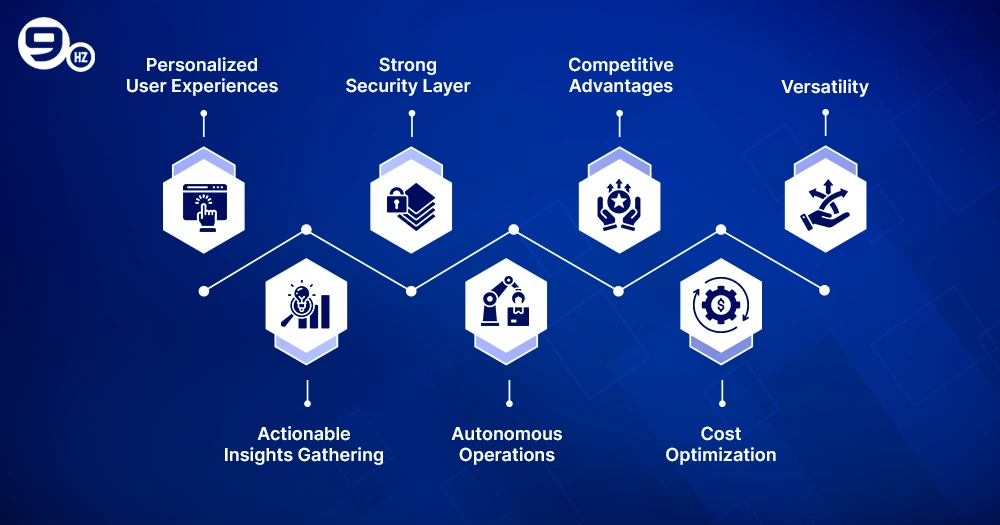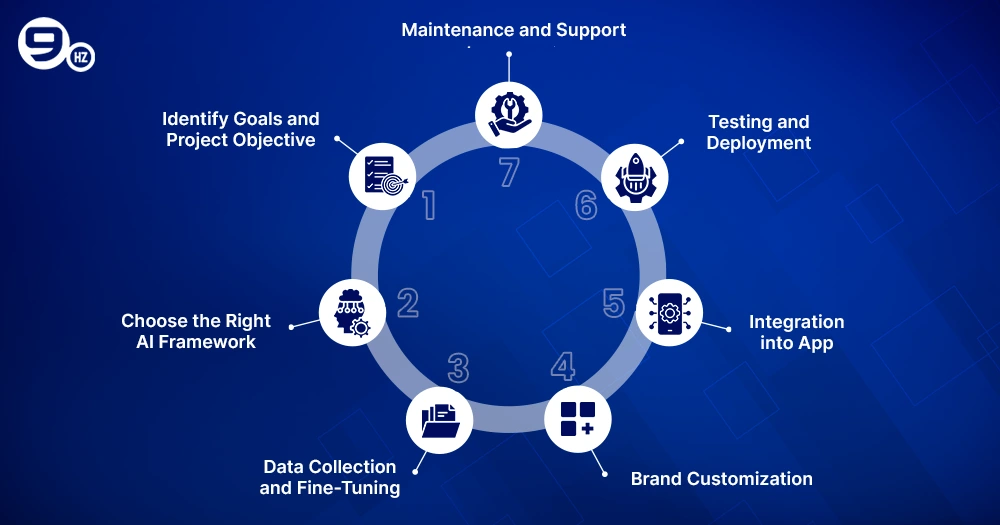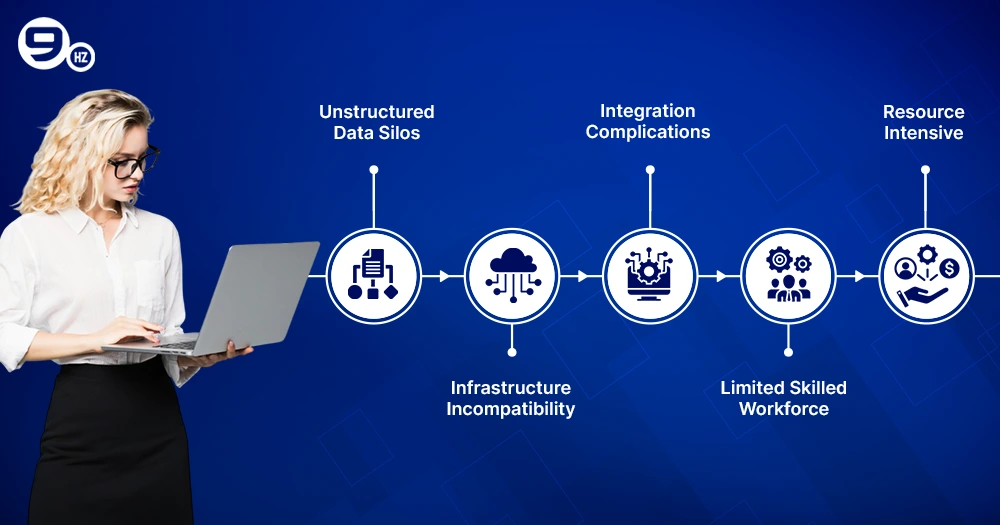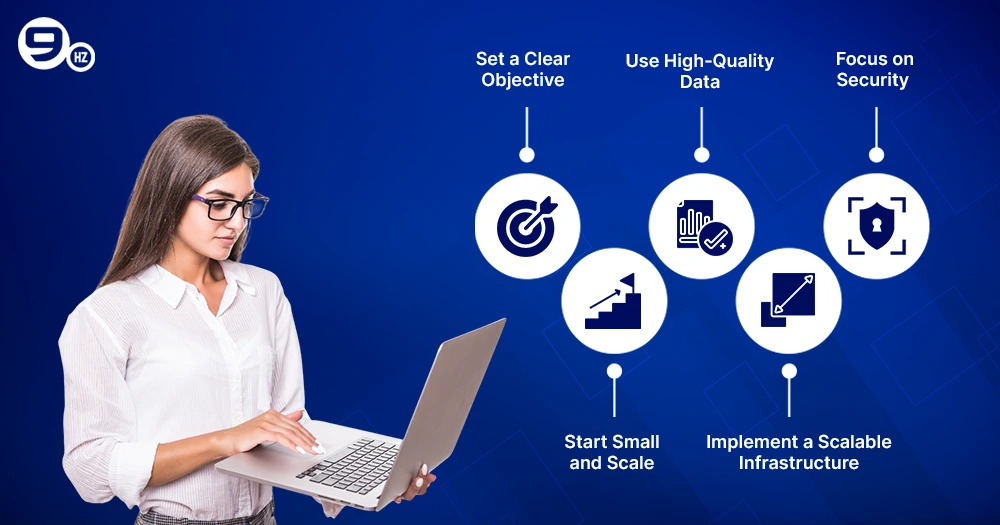Artificial intelligence has been doing wonders with mobile apps by imparting new functionalities, automating tasks, and making things more accessible. Whether it is personalized recommendations, biometric security, or the automated customer support feature that enhances overall customer experience, the benefits of AI can not be compiled in words. According to Market.us, the AI in the mobile app market size has a valuation of over $21.23 billion in 2024. The market is expected to show a CAGR of 32.5% to achieve a valuation of over $354.09 billion by the end of 2034.
However, if you want to leverage these benefits for your software, it is important to understand how to integrate AI into an app. Having a basic understanding of the process will help you make the right decision, evaluate outcomes, and build a market-winning digital product. Today, in this blog, we will be talking all about artificial intelligence integration into mobile apps, the challenges, the integration cost, AI integration strategies, and much more. Let’s get started-
Why Integrate AI Into an App?
There is no doubt that AI in mobile app development costs significantly increases the overall cost. Therefore, it is highly important for you to have a clear idea about the benefits and competitive advantages you can leverage to get a good return on the investment. Here are some of the benefits and key reasons for integrating AI into app-
1. Personalized User Experiences
Offering a personalized user experience to customers has become highly important in the competitive landscape, which helps to elevate customer retention. Artificial intelligence helps you gather data about customer preferences when buying a product or service. This data is then used to offer personalized recommendations to the customers, which not only brings a connection between brand and customer but also increases the overall sales. According to statistics, the revenue can be increased from 25% to 95% by just 5% improvement in the customer retention rate.
2. Actionable Insights Gathering
Strategies and operational decisions are the pillars of any business, and actionable data are the building blocks for those pillars. Artificial intelligence integration into the mobile app makes it easier for businesses to not only gather important information about the market trends, customers, and product feedback, but also structure it in a manner that makes it easy to understand. Thus, all the operational strategies, marketing campaigns, and product launches can be decided accordingly.
3. Strong Security Layer
68% of people around the world have concerns about protecting their confidential data and identity on online platforms. Therefore, integrating AI into apps adds an extra and stronger security layer that eliminates the chances of data hacking and breaches. It brings the user trust in the mobile app, ultimately increasing user retention.
4. Autonomous Operations
Manual and traditional operational processes are often time-consuming, prone to human errors, and require extensive resources. On the other hand, AI integration into mobile apps automates numerous tasks like customer support, data entry, Q&A, image classification, security compliance, and much more, which saves time, resources, and costs.
5. Competitive Advantages
Artificial intelligence has been transforming industries. Still, we can see the implementation on the limited mobile apps and platforms. Artificial intelligence integration into the mobile app makes the novel technology accessible to end users, which helps you embrace the competitive advantages. For instance, Meta integrated its AI chatbot into existing apps like WhatsApp and Instagram. Currently, Meta AI has reached nearly 1 billion monthly active users since its launch.
6. Cost Optimization
If you want to integrate AI in apps, it will require investment, and there is no doubt about it. However, when we flip the coin and consider the long-term advantages, it is observed that AI often reduces the operational costs to a significant extent, making it a great idea that brings a good ROI. For example, it reduces the reliance on the human workforce for repetitive and time-consuming tasks, it can offer better customer support, and at the same time, the multi-functional AI system eliminates the need for different and dedicated tech platforms.
7. Versatility
AI technology is highly versatile in nature, which makes it easier to use for mobile apps with different types of target audiences. Whether it is an e-commerce mobile app that aims to sell particular products to customers or a digital platform that only helps to connect vendors to customers, AI features can be highly customized to align with business goals and the firm’s strategy.
7 Steps to Integrate AI Into an App
The process to build an AI app or just integrating AI into the mobile app might vary according to the development team and project methodology. However, the core phases of the development are always constant, which helps you measure the key performance indicators, offer feedback to the development team, and ensure that the final product aligns with your expectations.
1. Identify Goals and Project Objective
The step begins with a brainstorming session where the client has to be sure about the business goals and project objectives that they want to achieve. This information plays a significant role in choosing the right artificial intelligence development company, finalizing integration approaches, deciding on the features, and much more. At the same time, when the final goals are conveyed well at the beginning of the project, it becomes easier to measure the project’s success without any chances of misunderstanding.
2. Choose the Right AI Framework
Once you have a clear project vision shared with the development team, the next step is generally dedicated to choosing the right technology stack that helps to integrate AI into apps. The technology stack is influenced by the development partner. For example, the technology stack to integrate AI into Android apps will differ from that to integrate AI into an iOS app.
For the same, you can prefer to use TensorFlow Lite for building recommendation engines, Core ML for iOS image recognition, and Dialogflow for chatbots. Similarly, Azure AI Services are preferred for the cloud setup and privacy while ensuring long-term scalability. Xcode and Android Studio are further used to check the compatibility of software with the development environment.
3. Data Collection and Fine-Tuning
The performance of AI in an app is entirely dependent on the amount and quality of data used to train the AI model. Therefore, this third stage is entirely dedicated to the development team to gather the required data from diverse sources like the organization’s internal system, PDFs, Excel, external data sources, and much more. At the same time, the fine-tuning process is also carried out at this step, which makes sure that all the information being fed to the AI model is accurate and doesn’t carry any bias. The fine-tuning process also helps to remove duplicates, anonymize sensitive information, and fix errors. The high-quality data helps the AI app to provide the most accurate and insightful results.
4. Brand Customization
As the name suggests, this step is dedicated to customizing the AI model according to a particular brand image and market positioning. For example, the feature list is executed at this step, which brings the predefined functionalities into the solution. Frameworks like PyTorch play the core role in customizing the AI solution according to your particular use case. Similarly, TensorFlow Lite and OpenAI API help in the quick deployment of the software. Moreover, quantization is also performed to reduce the size and latency of the AI model.
5. Integration into App
Once the AI model is well-trained and customized according to client requirements and business objectives, it is time to connect the AI model to the app. For the same, an AI model is embedded in the app’s codebase while ensuring that all the features, backend system, and user interface are well responsive.
The software development kits (SDKs) or APIs like Dialogflow’s SDK for chatbot or OpenCV for image processing are used for the integration. At the same time, the step ensures the integration throughout the frontend and backend architecture. For example, if you want to integrate AI chatbot into app, Dialogflow’s SDK will be integrated to connect the user input to conversational response.
6. Testing and Deployment
This is the final stage of integrating AI in mobile app development. Here, the quality analyst team conducts a range of quality tests like performance testing, speed testing, feature testing, manual testing, automated testing, and much more. It makes sure that the AI integration into the app is providing accurate and unbiased results. The step also includes the deployment of the app’s final version after thorough testing. The overall solution is then deployed to the app store, beginning with a beta version to analyze the performance of the application in a live environment.
The metrics like user engagement, error rates, and customer feedback are also gathered to make the required improvements.
7. Maintenance and Support
This is an ongoing process where the client opts for the technical assistance and development team. Here, the team makes sure the final software is performing well in the live environment. At the same time, the team consistently monitors the bugs and deploys mitigation strategies. The market trends are also followed to identify the new features that need to be integrated into AI solutions to stay relevant in the competitive market.
Moreover, the team provides periodic software updates that help to scale the solution according to changing customer and business requirements.
Real-World Examples of AI Integration in Apps
Artificial intelligence is already the core contributor to the success of many well-known mobile apps and online platforms. Having a glance at the real-world example of AI integration into apps can help you better understand the benefits-
1. Netflix
Netflix is one of the biggest OTT and video streaming platforms in the world, with more than 300million paid members around the world. The platform leverages artificial intelligence to integrate personalized recommendation capability and enhance the overall user experience. The AI integrated into the solution consistently tracks the user behavior, movie-watching preferences, and more. This data is then used by Netflix to suggest the most relevant content, movies, and videos that align with the users’ preferences.
2. LinkedIn
The biggest platform connecting professionals from different domains leverages AI integration strategies to help its audience do better than their peers. The platform uses artificial intelligence to understand the professional journey, skills, requirements, and preferences of the users by analyzing their profiles, scrolls, reactions, and more in real time. This information allows LinkedIn to bring relevant connections, suggest posts, offer recommendations for connecting with people in the same domain, find jobs based on skillset, and more.
3. PayPal
Users have always been concerned about the safety of their information as well as their finances. Recognizing this concern, PayPal integrated AI into its platform that now consistently monitors the system to identify anomalies, offer risk scores, deploy autonomous actions, and inform the relevant authorities before any breach is completed. At the same time, it also tracks all the transactions happening on the platform for future records.
Challenges of Integrating AI Into an App (and How to Overcome Them)
Integrating AI into apps is undoubtedly a complex process and thus comprises a lot of challenges that have to be tackled by deploying the right strategies. Therefore, you must partner with the artificial intelligence development company to effectively deal with the real-time challenges without impacting the budget and timeline of the project. Here are the challenges that most commonly arise during artificial intelligence integration in an app-
1. Unstructured Data Silos
The mobile apps are designed to collect and store data in multiple silos across platforms and departments. At the same time, some of the data might be inaccurate or unstructured, which can not be used to train the AI model.
Solution– Enterprise-wide data governance frameworks and an AI-driven data preprocessing pipeline can be implemented that breaks the data silos and consolidates all the information into a well-structured lake. At the same time, an ETL workflow is used to ensure the cleanliness and accuracy of data for AI model training.
2. Infrastructure Incompatibility
Integrating AI into apps requires a stable technology infrastructure that can fulfill the need for computing power to support the AI prowess. At the same time, older systems often have scalability and storage issues with low processing capacity. A low-latency environment is required in the existing system, which is very rare to find in older software.
Solution– Hybrid infrastructure modernization is one of the best practices that helps to mitigate the challenges. Cloud -native AI services with on-premise systems help to increase computing power without compromising data compliance. Techniques like Containerization and AI microservices APIs are also used to run the programs in low latency.
3. Integration Complications
The legacy code used to build the app years ago can be outdated, rigid, and complex to update. Integrating artificial intelligence and modern technologies into these codebases often results in compatibility issues.
Solution– A modular integration strategy consisting of middleware layers and API gateways is highly helpful to establish the seamless coordination between AI models and outdated systems. Moreover, wrapper techniques and progressive modernization are also ensured to enhance the compatibility of both software.
4. Limited Skilled Workforce
While the businesses have started moving toward artificial intelligence, the availability of a skilled workforce in the current scenario is still limited. Finding the right team of AI developers that can build or integrate AI into an apps is a highly challenging task.
Solutions– To make sure that you hire the right AI development company, you can check their efficiency by analyzing previous projects, assessing client testimonials, having a glance at their achievements, and more. At the same time, consider offshore development for a larger talent pool.
5. Resource Intensive
AI integration into apps is a resource-intensive task as it requires huge costs, time, technical resources, hardware support, and much more. Therefore, building AI solutions is often a very challenging task for most small or medium-sized businesses.
Solution– The best AI integration strategy can be hiring the development team from India, as you can hire the development team with the same proficiency and expertise at half the price as compared to hiring the same team from the USA, UK, Europe, and more.
How much will it cost to integrate AI into your business?
There is no doubt that AI app development cost generally requires a good investment. Generally, the average cost to integrate AI into your business or app might range between $40,000- $200,00. Having an understanding of the complete cost segregation throughout the project can help you take charge of the finances, save costs, and maintain the overall quality of the outcome. Here is a structure of costs to integrate AI into your business–
1. Project Planning
$2,000-$10,000
The project planning requires market research, competitor analysis, feature prioritization, and cost-benefit analysis. All these tasks require access to paid data sources, consultation from experts, and hiring AI strategists. Therefore, planning consumes a certain portion of the total AI integration cost in mobile apps.
2. Data Collection
$5,000-$30,000
This is the phase where the development experts collect and fine-tune the data to prepare it for the training of AI models. For the same, you can choose to collect data from users, third parties, and external systems. However, many external data sources are paid for, where you need to pay a fee to get the right data. Further, labelling, cleaning, and organizing the data into a structured format requires experts and IT professionals. At the same time, the cost is also utilized in researching and making the software compliant with data regulations like GDPR, DPDP, and HIPAA.
3. Development & Integration
Pre-trained AI APIs: $1,000 – $15,000
Custom AI Models: $20,000 – $100,000+
For the AI development and integration, you can either choose the pre-trained AI models and APIs from Amazon, Google, or OpenAI. It can bring the basic features like image recognition, chatbot, or personalization. Similarly, another option is to choose customized AI models where you can curate the software entirely from scratch while imparting the business logic and user behavior. While custom AI models are expensive, they offer better controls and uniqueness in the solution.
4. Tech Architecture & Infrastructure Upgrade
Estimated Cost: $5,000 – $50,000+
AI requires the storage, data pipelines, and cloud computing, which requires the upgradation of the legacy system for seamless integration. Thus, the model hosting, deployment, cloud integration, security optimization, and performance optimization consume a certain portion of the overall development cost.
5. Frontend and UX Integration
Estimated Cost: $3,000 – $20,000+
In order to ensure that all the AI features and functionalities are accessible to the end users, it is highly important to build a good frontend and user interface. For the same, the front-end developers use the right technologies to build the face of the application. At the same time, interactive elements, paid themes, logo designing, and many more tasks are carried out, which eat up certain dollars in the process.
6. Testing & Quality Assurance
Estimated Cost: $2,000 – $10,000+
The testing process includes unit testing, performance testing, speed testing, model validation, real-world user testing, ensuring feedback loops, integration testing, and much more. All this requires numerous tools, hardware, and the time of a quality analyst.
7. Ongoing maintenance and model retraining
Estimated Monthly Cost: $1,000 – $10,000/month
AI models require consistent updates and monitoring to make sure that everything is working according to the set goals in the live environment. For example, it includes regular retraining with the latest data, fixing bugs, performance improvement sessions, adding new features according to user needs, monitoring to identify anomalies, latency, and much more.
8. Licensing, API costs, and Subscriptions
Estimated Monthly Cost: $500 – $5,000/month
Several third-party and API integrations are required to bring certain functionalities into the software. For example, OpenAI integration helps to bring AI prowess, Google/Apple Maps helps to bring navigation facilities, etc. The pricing of these APIs is based on the number of requests, model complexity, and response size. Also, the additional charges are often implemented for the advanced features, higher data limits, and faster response time.
AI Integration Strategies & Best Practices
Certain AI integration strategies & practices help businesses ensure the seamless onboarding of novel technology into their operations while achieving the defined goals. At the same time, most of these strategies can even help you lower the development cost without compromising the overall quality-
1. Set a Clear Objective
Make sure that you have a clear idea about what you want to build and what you want to achieve by building it. Having a clear objective of the project helps you choose the right team, prioritize features, onboard a team with the right hiring model, establish clear communication, set key performance indicators, get accurate cost and timeline estimation, and analyze the outcome.
2. Start Small and Scale
Instead of integrating hundreds of AI features in one go, you can prefer to begin with a pilot feature. For instance, you can start with integrating the chatbot, recommendation engine, or fraud detection system, whichever is most important at the time. This will help you check the integration capability of your existing system and eliminate the need for a sudden big investment. You can always scale up gradually by adding new features.
3. Use High Quality Data
No doubt collecting or purchasing high-quality data might require a good amount of money, but the returns are significant. Relying on lower-quality data might save you some dollars at the beginning, but the inefficiency and inaccurate outcomes might cost you much more. The biased results can never help you retain users and thus affect the ROI.
4. Implement a Scalable Infrastructure
AI is not at the threshold, and there is still a lot to be explored. Therefore, make sure that you implement a scalable architecture that can easily accept the features and updates in the future. It will make sure that you can always upgrade your existing app without starting from scratch, and keep the feature relevant according to dynamic user expectations.
5. Focus on Security
AI has brought convenience as well as data concerns for millions of users. People are highly concerned about sharing their information with any AI model due to the chances of a data breach or misuse of information. Thus, in your AI integration strategy, you must prioritize security implementation while integrating AI into apps using techniques like encryption and secure APIs. As soon as you ensure the data security for your users, your platform is always going to be their first choice.
How Can The NineHertz Help You With AI Integration?
There is no doubt that the overall outcome and efficiency of your project depend hugely on the AI development team that you partner with. Therefore, it is highly crucial to find the right artificial intelligence development company for your project.
The NineHertz has partnered with businesses globally to help them integrate AI into their systems and embrace novel technology to automate their operations. By offering a blend of technological expertise and a collaborative development environment, our team makes AI implementation accessible to all.
1. R&D Focused Development Approach
NineHertz focuses on research and development, where our experts understand the root cause of business challenges, real-time market gaps, customer expectations, and much more. This data is then used to curate the personalized project roadmap and make better decisions.
2. Data Security and Compliance
Our team closely monitors all the data security compliance and regulations to handle all the sensitive data. We make sure that the final AI solution adheres to all the relevant laws and regulations, including GDPR, SOC2, and HIPAA.
3. Scalable Delivery Model
We focus on the long-term growth of our clients, and therefore, we offer scalable mobile delivery while utilizing an agile and DevOps-driven development process. Not only does it ensure the faster deployment of the solution, but it also helps to seamlessly integrate the new features into the solution.
4. Domain Expertise
The NineHertz comprises a team of dedicated domain experts who help us to understand the industry-related challenges and market gaps. By collaborating closely with the development team, they help to choose the right features. This approach significantly helps to control costs while increasing usability.
5. Non-Disclosure Agreement
We respect all the information related to the project and the client. Thus, we sign a non-disclosure agreement at the beginning of development, which ensures that all the information is kept safe within the concerned parties.
Conclusion
Integrating AI into apps can be a significant decision to replace your legacy system while gaining a competitive edge in the market. Whether it is an AI chatbot to offer better customer support or a personalized recommendation engine that suggests relevant products or services to enhance user experience and sales, AI has been doing wonders. However, it is highly important to partner with the right AI development company to leverage these benefits.
If you are also looking to integrate AI into your mobile app, get a free consultation from our experts and make the right decision.
Frequently Asked Questions (FAQs)
1. How to implement AI in your application?
Here is the overall processing of implementing AI into your application-
- Identify Goals and Project Objective
- Choose the Right AI Framework
- Data Collection and Fine-Tuning
- Brand Customization
- Integration into App
- Testing and Deployment
- Maintenance and Support
2. How to Integrate AI into Your Business?
In order to integrate AI into your business, first of all, you must have an understanding of the real-time challenges and features needed to mitigate these challenges. Once you have analyzed the gap, you can collaborate with a development team to share the same information and curate a personalized roadmap to integrate AI into your business.
3. How Much Time Does It Take to Integrate AI into an Existing Application?
Generally, it takes 6-8 months to integrate AI into an existing application. However, the timeline might vary on the basis of different factors like project complexity, third-party integration, API integration, customization, size of development team, hiring model, data availability, etc.
Great Together!













